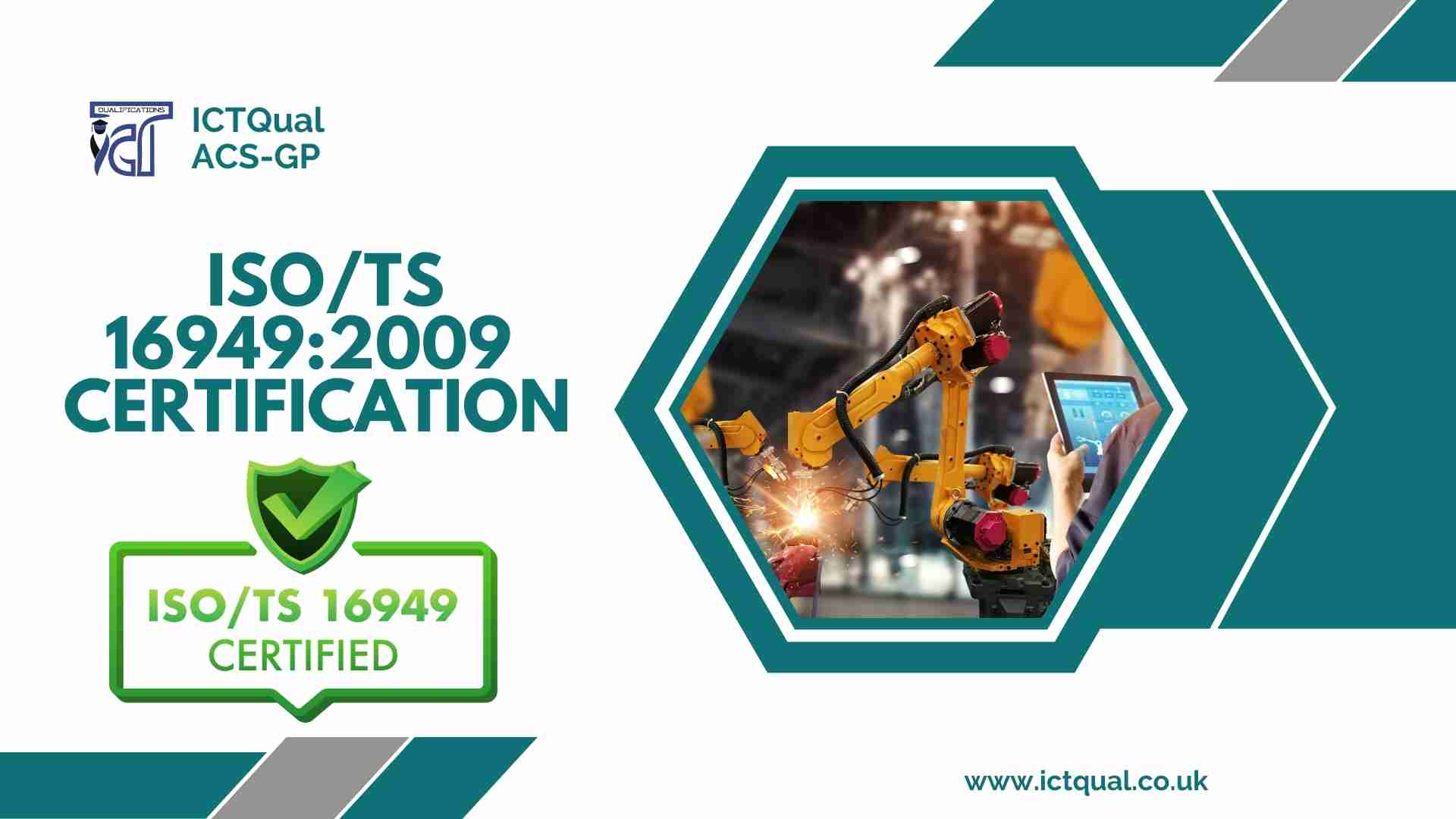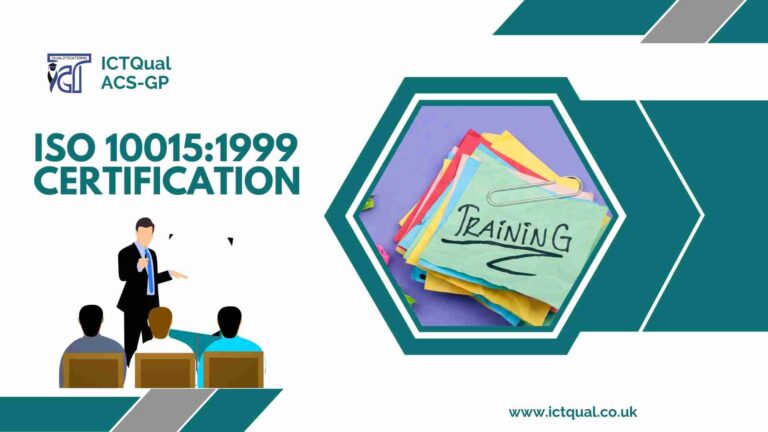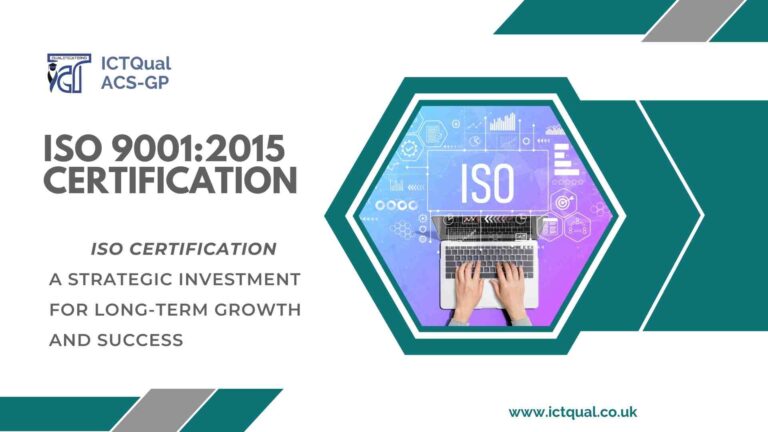Attention all automotive companies! Are you looking to enhance your quality management system and gain a competitive edge in the industry? Look no further than ISO/TS 16949:2009 Certification!
This internationally recognized certification demonstrates your commitment to quality management and customer satisfaction. It helps to establish trust and credibility with customers, suppliers, and stakeholders, and can improve your company’s efficiency and reduce costs.
Don’t miss out on the benefits of ISO/TS 16949:2009 Certification! Our experts can guide you through the certification process and help your company achieve operational excellence. Contact us today to learn more!
ICTQual is Exclusive partner of ACS-GP and providing services for company registration with ISO in following ISO Standards
ISO/TS 16949:2009 Certification
ISO/TS 16949:2009 is a quality management system (QMS) standard that is specifically designed for the automotive industry. It was developed by the International Automotive Task Force (IATF) in collaboration with the International Organization for Standardization (ISO). The ISO/TS 16949:2009 certification is globally recognized as the benchmark for quality management in the automotive industry.
This certification is a must-have for any company that is involved in the manufacturing, supply, and distribution of automotive components. It provides a framework for establishing, implementing, maintaining, and improving a QMS that meets the needs of the automotive industry. The ISO/TS 16949:2009 standard is based on the ISO 9001:2008 standard, with additional requirements that are specific to the automotive industry.
The main objective of ISO/TS 16949:2009 certification is to promote continuous improvement, defect prevention, and waste reduction in the automotive industry. It helps companies to establish a quality management system that is focused on customer satisfaction, efficiency, and effectiveness. The certification process involves a thorough evaluation of a company’s QMS by a third-party certification body.
The benefits of ISO/TS 16949:2009 certification include improved product quality, increased customer satisfaction, enhanced competitiveness, and reduced costs. It also helps to establish trust and credibility with customers, suppliers, and other stakeholders. By achieving this certification, companies demonstrate their commitment to quality management and customer satisfaction.
ISO/TS 16949:2009 certification is a vital requirement for companies that are involved in the automotive industry. It provides a framework for establishing a quality management system that is focused on continuous improvement and customer satisfaction. The certification helps companies to achieve operational excellence, reduce costs, and stay ahead of the competition
Benefits of ISO/TS 16949:2009 Certification
ISO/TS 16949:2009 certification is a valuable asset for companies operating in the automotive industry. This certification is specifically designed to help companies improve their quality management systems and increase customer satisfaction.
Here are some key benefits of ISO/TS 16949:2009 certification:
Enhanced Quality Management
ISO/TS 16949:2009 certification provides a framework for companies to establish and maintain a quality management system that meets the needs of the automotive industry. This helps companies to ensure that their products and services meet the highest standards of quality.
Increased Customer Satisfaction
ISO/TS 16949:2009 certification demonstrates a company’s commitment to customer satisfaction. By implementing a quality management system that focuses on customer needs and expectations, companies can improve customer satisfaction and loyalty.
Improved Efficiency
ISO/TS 16949:2009 certification promotes the adoption of best practices and continuous improvement in quality management. This helps companies to reduce waste, improve efficiency, and increase productivity.
Global Recognition
ISO/TS 16949:2009 certification is recognized worldwide as a standard for quality management in the automotive industry. By achieving this certification, companies can demonstrate their commitment to quality and competitiveness in the global market.
Cost Savings
ISO/TS 16949:2009 certification helps companies to identify and eliminate non-conformities, defects, and waste in their processes. This can lead to significant cost savings and increased profitability.
Access to New Markets
ISO/TS 16949:2009 certification is often a requirement for doing business with major automotive manufacturers. By achieving this certification, companies can expand their customer base and access new markets.
ISO/TS 16949:2009 certification provides numerous benefits for companies operating in the automotive industry. It helps companies to improve their quality management systems, increase customer satisfaction, and achieve operational excellence. By understanding the benefits of ISO/TS 16949:2009 certification, companies can make informed decisions and take the necessary steps to achieve this certification.
Certification Process for ISO/TS 16949:2009
The certification process for ISO/TS 16949:2009 is a comprehensive evaluation of a company’s quality management system (QMS) to ensure that it meets the requirements of the international standard for the automotive industry. In this article, we will explain the certification process in detail to help you understand the steps involved in achieving ISO/TS 16949:2009 certification.
Pre-Assessment
The first step in the certification process is the pre-assessment. This involves a review of your quality management system to identify any gaps that need to be addressed before the certification audit. The pre-assessment can be conducted by an internal auditor or a third-party auditor.
Certification Audit
The certification audit is the most critical step in the certification process. It involves a comprehensive evaluation of your quality management system to ensure that it meets the requirements of the ISO/TS 16949:2009 standard. The audit is conducted by a third-party certification body that is accredited to conduct ISO/TS 16949:2009 audits.
The audit includes a review of your documentation, policies, procedures, and records, as well as an on-site inspection of your facility to verify that your QMS is being implemented effectively.
Corrective Actions
If any non-conformances are identified during the certification audit, corrective actions will need to be taken to address them. The corrective actions should be implemented promptly and effectively, and evidence of their effectiveness should be provided to the auditor.
Certification Decision
After the corrective actions have been taken, the auditor will review the evidence of their effectiveness and make a certification decision. If your quality management system meets the requirements of the ISO/TS 16949:2009 standard, you will be awarded the certification.
Surveillance Audits
Once you have been awarded the certification, you will need to undergo surveillance audits to maintain your certification. The surveillance audits are conducted annually to ensure that your quality management system continues to meet the requirements of the standard.
In conclusion, the certification process for ISO/TS 16949:2009 is a rigorous evaluation of a company’s quality management system to ensure that it meets the requirements of the international standard for the automotive industry. By understanding the certification process, you can prepare your company for a successful audit and achieve ISO/TS 16949:2009 certification.
Key Requirements for ISO/TS 16949:2009 Certification
ISO/TS 16949:2009 is an important certification for companies in the automotive industry. To achieve this certification, companies must meet a number of key requirements. In this article, we’ll explore the most important requirements for ISO/TS 16949:2009 certification.
Leadership and Commitment
Companies must demonstrate strong leadership and commitment to implementing a quality management system that meets the requirements of ISO/TS 16949:2009. Top management must be involved in the development and implementation of the system, and must communicate the importance of quality management to all employees.
Customer Focus
ISO/TS 16949:2009 certification requires companies to have a strong focus on meeting customer requirements and ensuring customer satisfaction. This includes identifying and understanding customer needs, monitoring customer satisfaction, and continuously improving processes to meet customer expectations.
Process Approach
Companies must adopt a process approach to quality management, which involves identifying and managing interrelated processes that contribute to the achievement of quality objectives. This approach helps to ensure consistency and efficiency in the company’s operations.
Continuous Improvement
ISO/TS 16949:2009 certification requires companies to have a culture of continuous improvement, where employees are encouraged to identify and address areas for improvement in the quality management system. This includes using data and feedback from customers and other stakeholders to drive improvement.
Supplier Management
Companies must have effective supplier management processes in place, including selecting and evaluating suppliers based on their ability to meet quality requirements. Suppliers must be managed throughout the supply chain to ensure that they meet the company’s quality expectations.
Process Monitoring and Measurement
ISO/TS 16949:2009 certification requires companies to monitor and measure their processes to ensure that they are meeting quality objectives. This includes using data and metrics to identify areas for improvement and to track progress over time.
Corrective Action
Companies must have a process for identifying and addressing nonconformities in the quality management system. This includes taking corrective action to prevent the recurrence of nonconformities and to continuously improve the system.
Meeting these key requirements is essential for companies that want to achieve ISO/TS 16949:2009 certification. By implementing a quality management system that meets these requirements, companies can improve their operations, enhance customer satisfaction, and gain a competitive advantage in the automotive industry.
Importance of ISO/TS 16949:2009 Certification for Company Registration
ISO/TS 16949:2009 certification is an essential requirement for companies that want to succeed in the automotive industry. It provides a framework for establishing, implementing, maintaining, and improving a quality management system that meets the needs of the automotive industry. In this article, we will discuss the importance of ISO/TS 16949:2009 certification for company registration.
Increased Credibility and Trust
ISO/TS 16949:2009 certification demonstrates that a company has implemented a quality management system that is focused on customer satisfaction and continuous improvement. This certification provides assurance to customers, suppliers, and other stakeholders that the company is committed to delivering high-quality products and services. It also helps to establish credibility and trust, which can lead to increased business opportunities and revenue.
Enhanced Competitiveness
ISO/TS 16949:2009 certification is a globally recognized standard that is widely accepted in the automotive industry. Companies that achieve this certification are seen as more competitive and reliable than those that do not. This certification helps companies to differentiate themselves from their competitors and to gain a competitive advantage in the market.
Improved Quality Management
ISO/TS 16949:2009 certification provides a framework for establishing and maintaining a robust quality management system. This system helps companies to identify and address areas for improvement in their processes and procedures. It also promotes a culture of continuous improvement, where companies strive to improve their quality management system and enhance customer satisfaction.
Reduced Costs and Increased Efficiency
ISO/TS 16949:2009 certification helps companies to reduce costs by eliminating waste, reducing defects, and improving efficiency. This certification promotes a culture of lean manufacturing, where companies strive to optimize their processes and procedures to reduce costs and increase efficiency.
Compliance with Regulatory Requirements
ISO/TS 16949:2009 certification ensures that a company is compliant with regulatory requirements in the automotive industry. This certification helps companies to meet the requirements of customers and regulatory authorities, which can lead to increased business opportunities and revenue.
In conclusion, ISO/TS 16949:2009 certification is essential for companies that want to succeed in the competitive automotive industry. This certification demonstrates a commitment to quality management and customer satisfaction, and it helps companies to achieve operational excellence and stay ahead of the competition.
Conclusion
ISO/TS 16949:2009 certification is a critical requirement for companies involved in the automotive industry. It is a globally recognized standard that helps organizations establish and maintain a quality management system that meets the needs of the automotive industry, while also promoting continuous improvement and customer satisfaction.
By achieving ISO/TS 16949:2009 certification, companies can demonstrate their commitment to quality management and enhance their reputation with customers, suppliers, and stakeholders. The certification process requires a thorough evaluation of a company’s processes and procedures, which helps to identify areas for improvement and promote operational excellence.
As the automotive industry continues to evolve and become more competitive, ISO/TS 16949:2009 certification will become even more critical for companies seeking to succeed in this space. By investing in this certification, companies can position themselves for long-term success and growth, while also improving their bottom line.
Overall, ISO/TS 16949:2009 certification is a must-have for any company that wants to establish itself as a leader in the automotive industry and achieve operational excellence. It provides a framework for quality management that is focused on continuous improvement, customer satisfaction, and long-term success.







